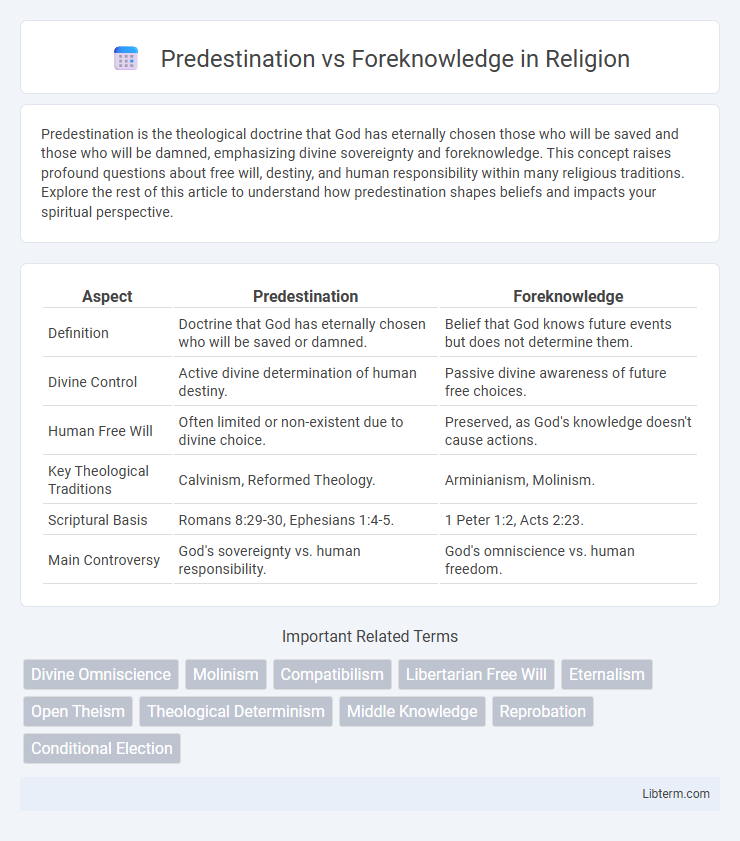Predestination is the theological doctrine that God has eternally chosen those who will be saved and those who will be damned, emphasizing divine sovereignty and foreknowledge. This concept raises profound questions about free will, destiny, and human responsibility within many religious traditions. Explore the rest of this article to understand how predestination shapes beliefs and impacts your spiritual perspective.
Table of Comparison
| Aspect | Predestination | Foreknowledge |
|---|---|---|
| Definition | Doctrine that God has eternally chosen who will be saved or damned. | Belief that God knows future events but does not determine them. |
| Divine Control | Active divine determination of human destiny. | Passive divine awareness of future free choices. |
| Human Free Will | Often limited or non-existent due to divine choice. | Preserved, as God's knowledge doesn't cause actions. |
| Key Theological Traditions | Calvinism, Reformed Theology. | Arminianism, Molinism. |
| Scriptural Basis | Romans 8:29-30, Ephesians 1:4-5. | 1 Peter 1:2, Acts 2:23. |
| Main Controversy | God's sovereignty vs. human responsibility. | God's omniscience vs. human freedom. |
Understanding Predestination: A Theological Overview
Predestination refers to the divine determination of souls' eternal destiny, emphasizing God's sovereign choice before creation based on His will and purpose. This theological doctrine explores God's intimate knowledge and control over salvation, often contrasted with human free will and moral responsibility. Understanding predestination requires examining biblical texts such as Romans 8:29-30 and Ephesians 1:4-5, which highlight God's foreordaining plan without negating human accountability.
The Concept of Divine Foreknowledge Explained
Divine foreknowledge refers to the theological concept that God possesses complete and infallible knowledge of all events past, present, and future. This attribute implies that God's awareness of future occurrences is certain and unchanging, encompassing every detail before it happens. Understanding divine foreknowledge is essential in debates about predestination, as it raises questions about human free will and divine sovereignty.
Historical Context: Predestination in Major Religions
Predestination has been a central doctrine in Christianity, particularly in Calvinism, where it asserts that God has sovereignly chosen who will be saved or damned before creation. In Islam, the concept of Qadar emphasizes God's foreknowledge and divine decree, balancing human free will with predestined fate. Judaism traditionally focuses more on human responsibility and covenantal relationship, with less emphasis on predestination but acknowledges God's foreknowledge of human actions.
Key Differences Between Predestination and Foreknowledge
Predestination is the doctrine that all events, particularly regarding salvation, are determined by divine will, ensuring specific outcomes regardless of human actions, while foreknowledge refers to God's ability to know future events without influencing them. Predestination implies causality and inevitability, whereas foreknowledge is observational and non-deterministic. The key difference lies in predestination's assertion of divine control over destiny, contrasting with foreknowledge's emphasis on God's awareness of future free choices.
Scriptural References: Predestination vs. Foreknowledge
Romans 8:29 emphasizes predestination by stating that those God foreknew, He also predestined to be conformed to the image of His Son, linking foreknowledge and predestination closely. Ephesians 1:5 highlights predestination by declaring God's purpose to adopt believers as His children through Jesus Christ, reinforcing divine sovereignty in salvation. 1 Peter 1:2 references foreknowledge to describe believers as chosen according to the foreknowledge of God the Father, underlining God's prior awareness in the election process.
Philosophical Implications of Divine Foreknowledge
Divine foreknowledge raises significant philosophical questions about human free will and moral responsibility by suggesting that all future events are already known and possibly determined by a higher power. The tension between predestination and foreknowledge challenges the coherence of libertarian free will, as foreknowledge implies inevitability, which can conflict with the concept of genuine choice. Philosophers debate whether foreknowledge necessitates predestination or if knowledge of future events can coexist with human freedom without compromising ethical accountability.
Free Will and Its Relationship to Predestination
Free will's relationship to predestination remains a central debate in theology and philosophy, exploring whether human choices are genuinely autonomous under divine sovereignty. The concept of predestination suggests that God has predetermined every event and outcome, challenging the notion of free will by asserting that individual decisions align with a divine plan. Foreknowledge, which holds that God knows all future actions, is often interpreted in a way that preserves free will, allowing humans to make genuine choices while God's knowledge does not cause those choices.
Debates and Controversies: Predestination vs. Foreknowledge
The debates surrounding predestination versus foreknowledge center on whether God's sovereign will determines every event or if His knowledge of future choices allows for genuine human free will. The controversy often pivots on theological interpretations of scriptures such as Romans 8:29-30 and Isaiah 46:10, where the nature of divine election and omniscience are contested. Philosophers and theologians engage in rigorous discourse to reconcile God's foreknowledge with the doctrine of predestination, questioning the implications for moral responsibility and salvation.
Modern Perspectives on Divine Omniscience
Modern perspectives on divine omniscience increasingly explore the nuanced distinctions between predestination and foreknowledge, emphasizing God's complete awareness of all temporal events without necessarily causing them. Contemporary theologians propose models such as middle knowledge (Molinism) that reconcile human free will and divine sovereignty by suggesting God's foreknowledge includes counterfactuals--what free creatures would do in any circumstance. This approach refines classical doctrines by highlighting God's exhaustive understanding of possibilities while allowing genuine human freedom within divine providence.
Practical Impacts on Faith and Daily Life
Predestination shapes believers' trust in divine sovereignty, encouraging acceptance of life's events as part of a divine plan, which can provide comfort and reduce anxiety. Foreknowledge emphasizes God's omniscience without necessarily determining choices, promoting personal responsibility and moral accountability in daily decisions. Both doctrines influence prayer, hope, and ethical behavior, affecting how individuals navigate challenges and make life choices within their faith traditions.
Predestination Infographic

 libterm.com
libterm.com